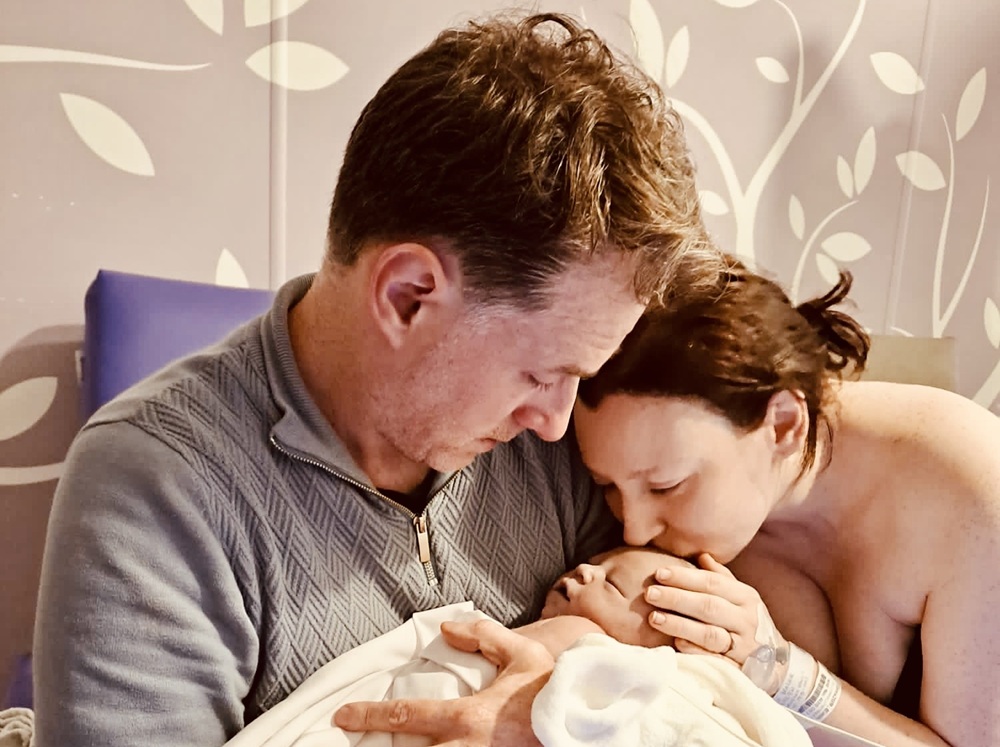Lack of checks during labour contributed to newborn baby’s death – coroner

Insufficient checks on a mother who was left unattended while giving birth in hospital contributed to the death of her newborn baby, a coroner has found.
Emily Brazier, from Cardiff, was admitted to the University Hospital of Wales for the induction of her baby daughter, Liliwen Iris Thomas, on October 8 2022.
She was induced the following day and given pethidine and codeine, as well as Entonox (gas and air), for pain relief that night.
Her partner Rhodri Thomas had been asked to return home because of a policy then in place of having no partners on the ward from 9pm to 9am, unless their partner was in active labour.
Unresponsive
South Wales Coroners’ Court heard Ms Brazier suffered an “exaggerated” physical response to the pain relief she had been administered, which resulted in her becoming unresponsive between 1am and 2.15am on October 10.
Staff did not conduct enough checks or physical examinations on Ms Brazier – who was on a hospital bay with curtains pulled closed around it – to notice that her labour was progressing.
Ms Brazier awoke at 2.15am to find Liliwen had been born and was between her legs, under the sheet. Resuscitation attempts were made but Liliwen was pronounced dead at 10.40pm that day.
A post-mortem examination found Liliwen died from perinatal asphyxia, with congenital bacterial infection and malperfusion of the placenta – where the function of the placenta is impaired.
Rachel Knight, coroner for South Wales Central, told an inquest in Pontypridd that a number of factors had contributed to Liliwen’s death.
Brain injury
She said: “Liliwen died from a hypoxic brain injury following an unattended delivery in hospital.
“This was contributed to by her mother not being attended to as frequently or subjected to as regular checks as she should have been and her progress to active labour not being recognised.”
Ms Knight said other contributing factors included Ms Brazier “suffering an exaggerated pharmacological response when the drugs codeine and pethidine were combined with Entonox”, and an “absence of resuscitation at birth”.
Speaking at the conclusion of Liliwen’s inquest on Tuesday, Ms Knight told Liliwen’s family she was “so sorry” to hear of her death.
“This is nothing short of a tragedy,” she told them. “I can’t imagine what you have been through.”
She said she was satisfied that Cardiff and Vale University Health Board, which runs the hospital, had made sufficient changes following Liliwen’s death.
But she added: “I remain concerned that the learning from this case may not have reached all corners of England and Wales.”
The coroner said she would write a prevention of future deaths report to the National Institute for Health and Care Excellence (NICE) “with a view to them considering the learning of Liliwen’s case”.
“This is not intended to be a criticism of them – it is for a learning opportunity,” she added.
‘Unbelievable tragedy’
During the inquest, Abigail Holmes, director of midwifery and neonatal services at Cardiff and Vale University Health Board, said the “unbelievable tragedy” had been a catalyst for change.
She described Liliwen’s death as “earth shattering”, adding that she believed every health board in Wales was aware of the case.
“Every member of staff was shaken by this. As the overall accountable member of staff, we are working tirelessly to ensure this never happens again,” she told Liliwen’s parents.
“I know that doesn’t bring your daughter back and I am so, so sorry.”
The inquest heard the maternity unit was busy at the time, with 17 midwives instead of 24. Two on call community midwives were brought in to increase the number of staff on the ward.
Ms Brazier rang her call bell at 9pm on October 9 to request pain relief and was given paracetamol and codeine, with Entonox later provided.
Pethidine was administered at 11.50pm and Ms Brazier was checked at 12.20am, with midwives noting she was still using Entonox at that time.
At 12.50am, Ms Brazier was checked by a midwife but not given a physical examination. This was the last time she was seen conscious before it was discovered Liliwen had been born.
A visual check was made of Ms Brazier at 1.15am and she was believed to be asleep.
Midwives heard Ms Brazier crying out for help at 2.14am and discovered Liliwen had been born unattended.
‘Breach of care’
Dr Rachel Liebling, a consultant in fetal medicine and obstetrics at St Michael’s Hospital in Bristol, wrote a report following Liliwen’s death.
She concluded: “There is no doubt there was a failure to take adequate care of Emily following her induction of labour.
“My opinion is that this breach of care more than minimally contributed to the death of Liliwen Thomas.”
Since Liliwen’s death, staffing levels have increased at the hospital, protocols have been updated and training has been provided.
Lara Bennett, senior associate at Slater and Gordon in Cardiff, who represented Liliwen’s family, said the inquest had been “hugely distressing” for them.
The case highlights concerns regarding understaffing and an absence of care and monitoring on maternity wards, Ms Bennett said.
“It is imperative that the policy changes to maternity services implemented by Cardiff and Vale University Health Board as a direct result of this tragic event are adopted across all Welsh Health Boards,” she added.
“Liliwen’s death must not be in vain and the maternity care standards across Wales must be improved to ensure no mother or baby ever suffers in this way again.”
Support our Nation today
For the price of a cup of coffee a month you can help us create an independent, not-for-profit, national news service for the people of Wales, by the people of Wales.




